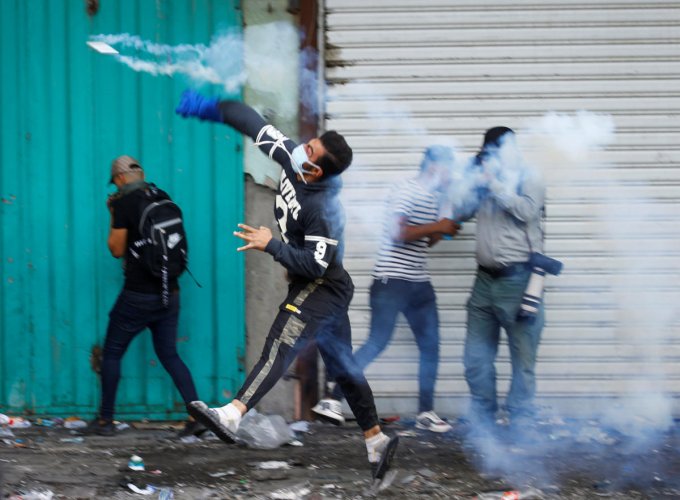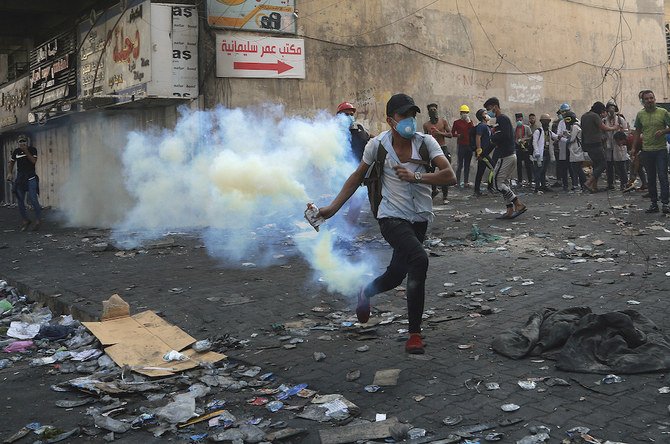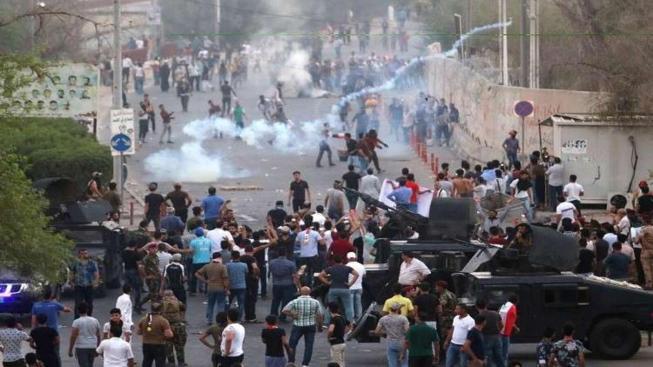www.aljazeerah.info
News, November 2019
Archives
Mission & Name
Conflict Terminology
Editorials
Gaza Holocaust
Gulf War
Isdood
Islam
News
News Photos
Opinion Editorials
US Foreign Policy (Dr. El-Najjar's Articles)
www.aljazeerah.info
|
Editorial Note: The following news reports are summaries from original sources. They may also include corrections of Arabic names and political terminology. Comments are in parentheses. |
Four More Iraqi Protesters Killed, 52 Injured, by Tear Gas Bombs, in Baghdad
November 14, 2019
Editor's Note:
The following are just examples of news stories about the continuous Iraqi government war to subjugate the northern provinces, using the pretext of fighting ISIS, or responding to alleged ISIS attacks, which no longer exists, according to the announcements of the Iraqi government itself.
Daily news stories can be accessed from the news sources listed below and others in the internet. Most likely, the available news stories are biased, as these do not include the two sides.
 |
 |
| An Iraqi demonstrator throws a tear-gas during ongoing anti-government protests in Baghdad, Iraq November 14, 2019 | An Iraqi protester throwing back a tear gas canister at police, in Baghdad, November 13, 2019 ap |
 |
|
| Iraqi police throwing tear gas canisters at protesters, in Baghdad, November 14, 2019 |
Four killed, 52 wounded in Baghdad protests: police, medics
November 14, 2019, BAGHDAD (Reuters) -
Iraqi security forces killed at least four people on Thursday and wounded more than 50 as they tried to push protesters further back to their main camp in central Baghdad, police and medical sources said.
On Thursday morning, three protesters died after tear gas canisters directly struck them in the head and another died in hospital from wounds from a stun bomb fired by security forces, the sources said.
Security forces used live rounds, rubber bullets and fired tear gas canisters in a bid to disperse hundreds of protesters gathered near Tahrir Square, a Reuters cameraman said.
At least half of the wounded protesters had injuries sustained from live ammunition, police and medical sources said.
The others were taken to hospital having choked on tear gas, or were struck by rubber bullets, the sources said.
The square has been the epicenter of the country’s anti-government protests for weeks.
Security forces increased use of tear gas, rubber bullets and live fire came after two days of relative calm.
More than 300 people have been killed since the protests in Baghdad and the south of the country started in early October, driven by discontent over economic hardship and corruption.
Demonstrations were also taking place in several locations in southern Iraq. Protesters on late Wednesday set fire to local officials’ houses in the town of Gharraf, 25 km (15 miles) north of the southern city of Nassiriya, security sources said.
Prime Minister Adel Abdul Mahdi’s government has taken some measures to try to quell the unrest, including handouts to the poor and creating more job opportunities for college graduates.
But it has failed to keep up with the growing demands of demonstrators who are now calling for an overhaul of Iraq’s sectarian political system and the departure of its entire ruling elite.
The unrest is among the biggest and most complex challenges to the current ruling elite since it took power after the U.S. invasion and the toppling of Saddam Hussein in 2003.
Since putting down an insurgency by Islamic State in 2017, Iraq has enjoyed two years of comparative stability. But despite its oil wealth, many people live in poverty with limited access to clean water, electricity, healthcare or education.
Reporting by Baghdad newsroom; Editing by Gareth Jones
Iraq protests swell as UN presses Baghdad to ‘step up’
Arab News, AFP, 13 November 2019
UN has put forward a phased roadmap calling for an immediate end to
violence and electoral reform within 2 weeks
Protesters have
escalated their demands to deep-rooted regime change.
BAGHDAD:
Iraqi officials must “step up” to respond to mass demonstrations, the UN representative in Baghdad told AFP on Wednesday as anti-government rallies swelled in Iraq’s capital and the country’s south.
Protests demanding an overhaul of the political system have rocked Baghdad and the Shiite-majority south for weeks — the crowds unmoved by government pledges of reform and undeterred by the deaths of more than 300 demonstrators.
Washington and the United Nations have called on the government to respond seriously to the protests, with the world body’s representative Jeanine Hennis-Plasschaert saying the country’s authorities must “step up to the plate and make things happen.”
“They are elected by the people, they are accountable to them,” the
head of the UN’s Iraq mission (UNAMI) told AFP in an exclusive
interview.
US Secretary of State Mike Pompeo, for his part, has said
he told Iraqi Prime Minister Adel Abdel Mahdi that he “deplored the
death toll” and to address the popular movement’s “legitimate
grievances.”
The protests had slowed for a few days following a deadly crackdown by security forces in Baghdad and major southern cities but flared again Wednesday with demonstrations by striking students and teachers.
“We’re here to back the protesters and their legitimate demands, which include teachers’ rights,” said Aqeel Atshan, a professor on strike, in Baghdad’s Tahrir (Liberation) Square, the epicenter of the protest movement.
In the southern port city of Basra, around 800 students returned to camp outside the provincial government headquarters, days after they had been pushed out by riot police.
Schools were also shut in the protest hotspots of Diwaniyah and Nasiriyah.
Protesters have felt emboldened since the country’s top Shiite
religious authority Grand Ayatollah Ali Sistani said they “cannot go
home without sufficient reforms.”
“Students, boys and girls alike,
are all here for a sit-in,” another demonstrator in Tahrir told AFP.
“If Sistani gave the orders for mass civil disobedience, everything
would close — the government, the oil companies, everything. That’s how
we’ll have a solution.”
The UN has put forward a phased roadmap,
backed by Sistani, calling for an immediate end to violence, electoral
reform and anti-graft measures within two weeks.
Hennis-Plasschaert,
the UN envoy, discussed the plan with lawmakers during a parliamentary
session on Wednesday afternoon.
“Now is the time to act, otherwise any momentum will be lost — lost at a time when many, many Iraqis demand concrete results,” she told them on the sidelines of the parliamentary meeting.
At the session’s opening, speaker of parliament Mohammed Al-Halbussi
pledged to work on laws to respond to protesters’ demands including
electoral reform.
Parliament has received a draft law for electoral
reform but has yet to discuss it.
Lawmakers also set dates to interrogate two ministers, which could
indicate the first steps of a cabinet reshuffle announced by Abdel
Mahdi.
Oil-rich Iraq is ranked the 12th most corrupt country in the
world by Transparency International, and youth unemployment stands at 25
percent.
Demonstrations erupted on October 1 in fury over a lack of
jobs and corruption, initially fracturing the ruling class.
Populist cleric Moqtada Sadr then called on the government to resign and President Barham Saleh suggested early elections, while other factions stood by Abdel Mahdi.
But after a series of meetings led by Iran’s influential Major General Qassem Soleimani, a consensus emerged at the weekend over the government remaining intact and both Saleh and Sadr appear to have changed their tunes.
Sadr, who is reported to be in Iran, took to Twitter on Wednesday to call on parliament to enact reforms and for “a general strike, even for one day,” but did not demand the premier step down.
Saleh, too, appears to have dropped the idea of early elections.
The agreement brokered by Soleimani appeared to have paved the way for a crackdown on demonstrations last weekend that sent the death toll amid the unrest to well over 300.
Iraq has faced growing criticism over its response to rallies, with rights defenders accusing authorities of shooting live rounds at protesters and curtailing freedom of expression with an Internet blackout and mass arrests.
Also on Wednesday, the president of autonomous Iraqi Kurdistan, Nechirvan Barzani, was in Baghdad to meet with the premier, president and speaker of parliament.
Barzani and Abdel Mahdi are believed to have good personal ties, and
the Iraqi Kurdish authorities have backed the current government.
But
they have worried that any amendments to Iraq’s 2005 constitution as
part of a reform process could infringe on Kurdish rights.
https://www.arabnews.com/node/1583621/middle-east
***
The following are news stories from the independent Iraqi Arabic news agency, Yaqein ( http://yaqein.net/ ):
***
|
3 Iraqi Protesters killed in renewed protests November 14, 2019 قتلى وجرحى مع تجدد القمع الحكومي للتظاهرات في بغداد 14 نوفمبر 2019 | الكاتب:يقين تجدد القمع الحكومي تجاه التظاهرات السلمية في ساحة التحرير و الخلاني وسط العاصمة بغداد، ما أسفر عن مقتل واصابة العشرات، في استخدام الرصاص الحي والقنابل المسيلة للدموع من عناصر مكافحة الشغب الحكومية. وقالت مصادر أمنية وطبية في العراق”اليوم الخميس” إن 3 متظاهرين قُتلوا، وأُصيب عشرات آخرون، من جراء مواجهات مع قوات الأمن الحكومي وسط بغداد. ونقلت وسائل اعلامية عن مصادر طبية قولها، إن المتظاهرين الثلاثة قُتلوا إثر قنابل غاز أطلقتها قوات الأمن الحكومي وسط بغداد. وكانت إحصائية سابقة تحدثت عن مقتل اثنين وإصابة 35 آخرين. وقالت المصادر إن أحد المحتجين قتل على الفور في الحال، إثر اصطدام عبوة غاز مسيل للدموع برأسه، في حين توفي الآخر في المستشفى متأثرا بجروح من قنبلة صوت أطلقتها قوات الأمن الحكومي،على ما أوردت وكالة “رويترز”. وقُتل أكثر من 300 شخص منذ الأول من أكتوبر مع إطلاق قوات الأمن الغاز المسيل للدموع والرصاص الحي على حشود المتظاهرين في بغداد، والمحافظات الجنوبية، بحسب مصادر طبية. وبدأت الموجة الثانية من الاحتجاجات في أواخر أكتوبر الماضي، وارتفع سقف مطالب المتظاهرين الى المطالبة بـ”إسقاط النظام السياسي”. ولم تتمكن الحكومة من تهدئة الاضطرابات التي وضعت الطبقة السياسية، المدعومة من إيران، في مواجهة شبان لم يشعروا بأي تحسن يذكر في ظروفهم وطنهم منذ 16 عاماً. والاحتجاجات التي يشهدها العراق، هي أشد وأعقد تحد منذ سنوات للنخبة السياسية الحاكمة التي هيمنت على المشهد السياسي بعد الاحتلال الأمريكي للعراق في عام 2003. |
***
Share the link of this article with your facebook friends
Fair Use Notice
This site contains copyrighted material the
use of which has not always been specifically authorized by the copyright
owner. We are making such material available in our efforts to advance
understanding of environmental, political, human rights, economic,
democracy, scientific, and social justice issues, etc. We believe this
constitutes a 'fair use' of any such copyrighted material as provided for
in section 107 of the US Copyright Law. In accordance with Title 17 U.S.C.
Section 107, the material on this site is
distributed without profit to those
who have expressed a prior interest in receiving the included information
for research and educational purposes. For more information go to: http://www.law.cornell.edu/uscode/17/107.shtml.
If you wish to use copyrighted material from this site for purposes of
your own that go beyond 'fair use', you must obtain permission from the
copyright owner.
|
|
|
|
||
|
||||||


